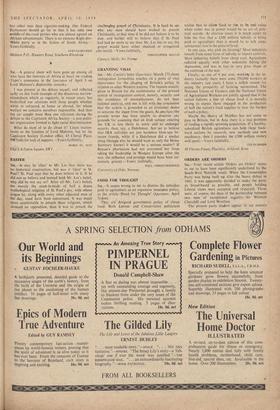FOOD FOR THOUGHT
SIR,—tt seems wrong to me to dismiss the subsidies paid to agriculture as an expensive insurance policy, as the article 'Food for Thought' (Spectator, April 3) dock.
They are designed government policy of cheap food. Both Labour and Conservative politicians
realise that to allow food to rise to Its real value while either was in power would he an act of poli- tical suicide. At election times it is much easier to hide the fact that a £300 million subsidy is being paid to agriculture than it would be to talk away substantial rises in the price of food.
In any case, why pick on farming? Most industries benefit from some form of subsidy or import controls. Most industries benefit from cheap coal. Agriculture suffered equally with other industries during the depression, and was in fact in very poor shape at the outbreak of the war.
Finally, as one of 4 per cent. working in the in- dustry (actually there were some 550,000 workers in the industry last year), 1 have a selfish reason for seeing the prosperity of farming maintained. The National Union of Farmers and the National Union of Agricultural Workers are jointly agreed that if the nation follows a. line of cheap food it is morally wrong to expect those engaged in the production of half the nation's food supplies to bear the burden of such a policy.
Maybe the theory of Malthus has not come to pass in Britain, but in Asia there is a real problem of feeding a rapidly-growing population. If a healthy, subsidised British agriculture can help they back- ward nations by research, new methods and new machinery, then I consider the £300 million money well spent.—Yours faithfully,














































 Previous page
Previous page